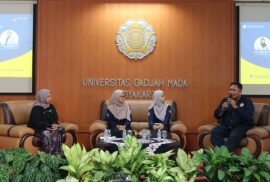The shift from print to digital in the deposit policy of scientific works is gaining momentum in higher education institutions. This strategic issue became the main topic during a benchmarking visit by Universitas Airlangga (UNAIR) Library to Universitas Gadjah Mada (UGM) Library and Archives on Tuesday (September 30, 2025).
Nusa Cendana University (Undana) strengthened its academic ties with Universitas Gadjah Mada (UGM) through a visit to the UGM Library and Archives on Monday (September 29, 2025). The meeting not only discussed library management but also marked the extension of an existing cooperation agreement.
The Library and Archives of Universitas Gadjah Mada (UGM) once again held the Information Literacy Miniclass program in September 2025. This initiative serves as a practical learning platform for the academic community to enhance their skills in accessing, managing, and analyzing scholarly information using advanced technologies.
Hundreds of stories of perseverance, determination, and dedication are compiled in the book Gema Mimpi Anak Negeri, which was the focus of a book review and inspirational talk show titled “Gema Mimpi Anak Negeri: LPDP Universitas Gadjah Mada untuk Nusantara” on Wednesday (24/9/2025). The book contains 131 narratives from LPDP awardees who share their life journeys to inspire Indonesia’s younger generation.
A warm and friendly atmosphere marked the closing of the Gadjah Mada Library and Archives Fair (GMLAF) 2025, held on the rooftop of the Universitas Gadjah Mada (UGM) Library and Archives on Friday (19/9/2025). The event served as a moment of reflection and appreciation for the series of activities successfully organized to celebrate the 2nd Anniversary of the UGM Library and Archives, while motivating staff to continue improving service quality.
Prof. Yako Kozano from Aichi Prefectural University, Japan, together with several students from the Land of the Rising Sun, visited Lawang Sajarah at the UGM Library and Archives on Thursday (18/9/2025). Prof. Yako, who has recently been collaborating with UGM and is highly proficient in Indonesian, introduced elements of Indonesian culture to his students through the rare collections at Lawang Sajarah. There, they learned firsthand about the management, organization, and development plans of rare and historical collections that form an important part of UGM’s institutional memory.
The role of Artificial Intelligence (AI) in driving the transformation of research and scientific publishing took center stage at the International Webinar “Empowering Learning, Research, and Publication in the AI-Driven Open Science Era,” organized by the UGM Library and Archives on Wednesday (17/9). This event is part of the Gadjah Mada Library and Archives Fair (GMLAF) 2025 series.
“Gathering should be seen as a way to humanize ourselves once again. A liberated soul is one that is not controlled by desires, and this is the key to preventing disease,” emphasized Dr. Zaenal Muttaqien Sofro, Circ&Med, AIFM, lecturer at the Faculty of Medicine, Public Health, and Nursing (FKKMK) UGM. He delivered this statement during a health lecture titled “Wellness from a Liberated Soul” held at the L1 Seminar Room, UGM Library and Archives, on Saturday (September 13, 2025).
Universitas Gadjah Mada’s (UGM) commitment to strengthening public information transparency was reaffirmed through the Internal Monitoring and Evaluation (Monev) Visit of the Information and Documentation Management Officer (PPID) Implementer 2025. On Tuesday (Sept 9), Dr. Andi Sandi Antonius Tabusassa Tonralipu, S.H., LL.M., together with the UGM PPID Team, visited the PPID Implementer at the UGM Library and Archives.
The atmosphere of competition and togetherness enlivened the series of events at the Gadjah Mada Library and Archives Fair 2025. The UGM Library and Archives successfully organized an interdepartmental table tennis tournament featuring four teams: the Library Division, the Archives and Administration Division, the Data and Information Systems Division, and the Cleaning Service team.










